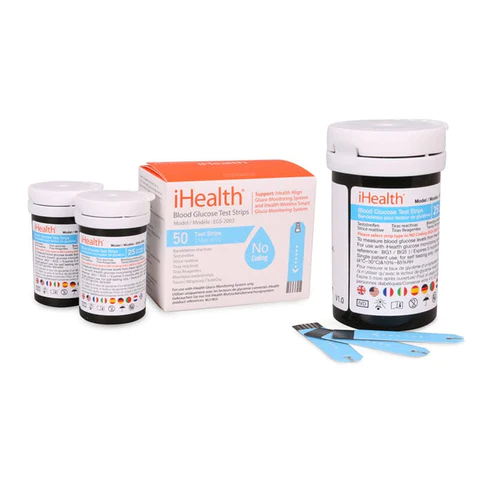iHealth® Blood Glucose Test Strip, No Code, Blue
iHealth® blood glucose test strips are used to measure blood sugar levels. A small blood sample, usually taken from a finger prick, is obtained for testing using a lancet and a lancing device. These test strips help to measure blood sugar levels in that sample by holding and loading it into a suitable glucose meter.
Construction
Blood glucose test strips comprise a reagent layer that contains enzymes and other chemicals, and electrodes for electrochemical analysis. These components of this test strip aid in accurately recording the blood sugar levels in a blood sample. These iHealth® blood glucose test strips have 4 layers which include:
- A top layer
- Adhesive layer
- Capillary channel-containing layer with GDH-FAD enzyme
- Electrode layer
Key Features and Benefits
iHealth® blood glucose test strips have the following additional features as well as benefits:
- No coding design enhances ease of usage
- BGL results range from 20 mg/dL to 600 mg/dL
- Takes fresh capillary whole blood as a sample source
- Offers ideal operating conditions at 50°F to 95°F
- 5-month long shelf-life after opening vial
- A small blood sample requirement of 0.7 µL
- High stability as the strips are not affected by the oxygen partial pressure
- Long shelf-life with 24 months expiration period from manufacture date
- Compatible with iHealth glucometers
- FDA and Medical CE-approved items
- Each pack contains 50 strips
Applications
iHealth® blood glucose test strips have the following applications in diabetic management:
- Blood Glucose Estimation: iHealth® blood glucose test strips are employed for holding the collected blood sample which is then loaded and analyzed by a suitable glucose meter. The product is single-use and allows the accurate estimation of blood glucose levels.
Packaging
iHealth® blood glucose test strips are packed in two vials to keep them fresh. This packaging also minimizes the exposure to light, heat, or moisture.
Caution
- The instructions given by the manufacturer should be strictly followed.
- Store the test strips in a cool and dry place.
- To maintain the accuracy of results, do not expose the test strips to extreme temperatures or moisture.
- Check for expiration dates before using test strips to avoid infection transfer.
- Always use new and unopened vials to obtain accurate results.
Warnings
- Do not share test strips among patients as it can lead to infection transfer.
- Never use expired test strips as these can compromise the accuracy of the readings and lead to miscalculations in the medication.
- Do not use strips that were pre-owned. These strips have an increased chance of expiration date tampering and can cause inaccurate results.
- Do not use glucose meters that are infected. Glucose meters must be properly disinfected after each use.
- Never store test strips in extreme temperatures. Storage must be done at a cool and dry place or as per the instructions given by the manufacturer.











Reviews
Clear filtersThere are no reviews yet.